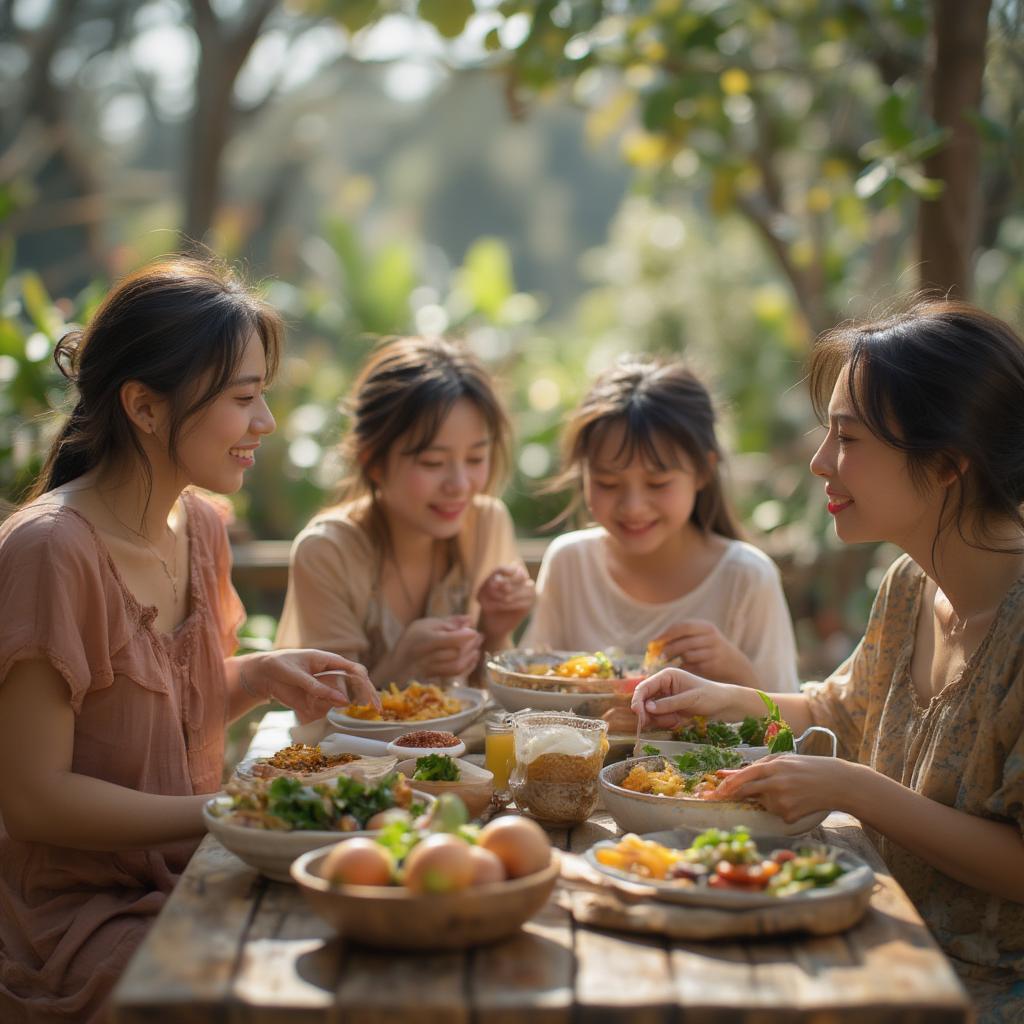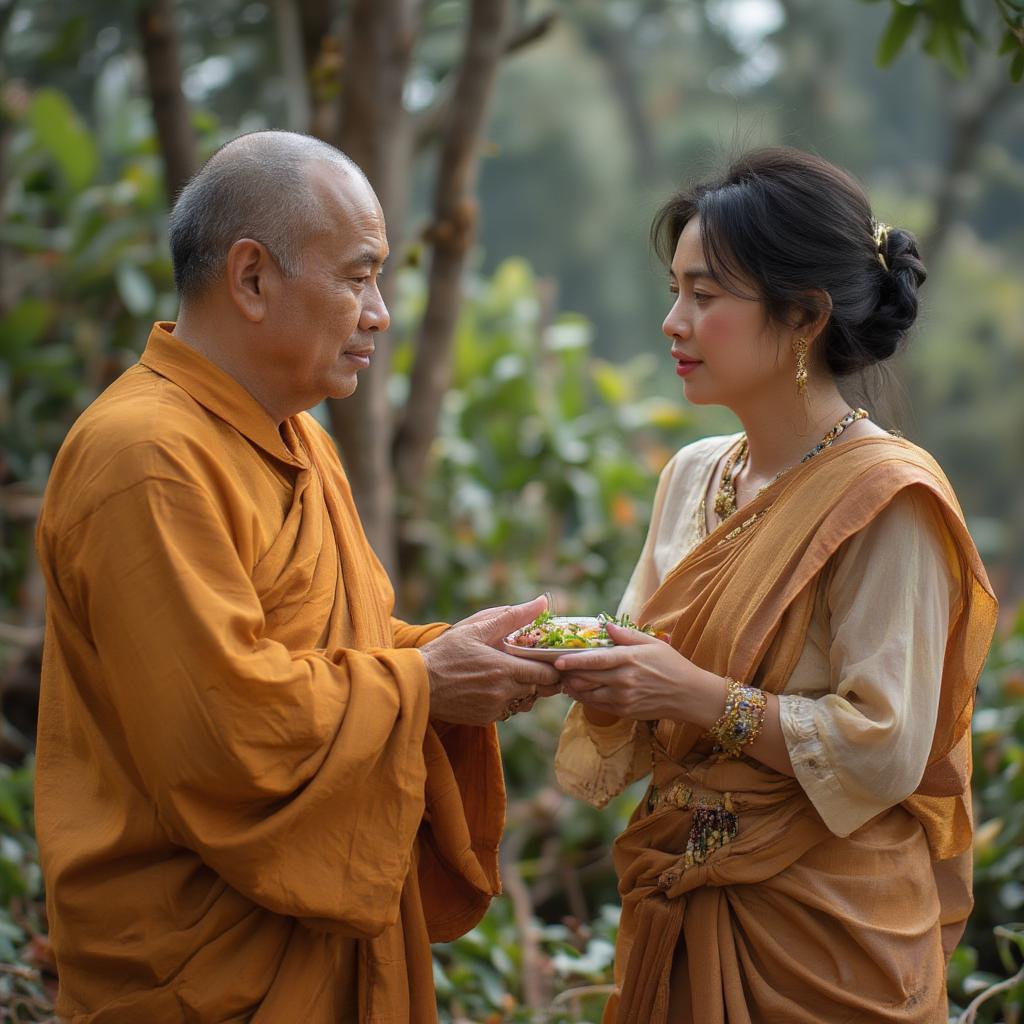Learning how to say “I love you” in Lao can deepen your connection with Lao culture and express your affection in a meaningful way. Whether you’re traveling to Laos, connecting with someone of Lao descent, or simply expanding your linguistic repertoire, this article will guide you through the nuances of expressing love in the Lao language.
Expressing Love in Lao: More Than Just Words
Saying “I love you” in any language is more than just reciting words; it’s about conveying genuine emotion. In Lao culture, expressing deep feelings often involves nonverbal cues like gentle touches, respectful gestures, and a soft-spoken demeanor. While words are important, understanding the cultural context adds depth to your expression of love.
Khoy Huk Chao (ຂ້ອຍຮັກເຈົ້າ): The Most Common Way to Say “I Love You” in Lao
The most common and direct way to say “I love you” in Lao is “Khoy Huk Chao” (ຂ້ອຍຮັກເຈົ້າ). “Khoy” (ຂ້ອຍ) means “I,” “Huk” (ຮັກ) means “love,” and “Chao” (ເຈົ້າ) means “you.” This phrase is suitable for expressing romantic love to a partner, as well as familial love to close family members.
Breaking Down the Pronunciation
While the Lao script might appear intimidating, the pronunciation is relatively straightforward. “Khoy” is pronounced similar to “koy” in English. “Huk” sounds like “hook,” and “Chao” is pronounced like “jow” with a falling tone. Practicing the pronunciation will ensure your message is clear and heartfelt.
Beyond “I Love You”: Other Ways to Express Affection in Lao
While “Khoy Huk Chao” is the most direct translation, there are other phrases that can express affection and care. “Bor Pen Nyang” (ບໍ່ເປັນຫຍັງ) translates to “you’re welcome” or “no problem” but can also convey a sense of caring, particularly when responding to a loved one’s request.
 A Lao family demonstrating affection through shared meals and laughter
A Lao family demonstrating affection through shared meals and laughter
Expressing Love Through Actions
In Lao culture, actions often speak louder than words. Showing love and care through acts of service, such as preparing a meal or offering assistance, can be just as powerful as verbal expressions.
How to Say I Love You in Lao: Formal vs. Informal
Similar to many languages, Lao has different levels of formality. While “Khoy Huk Chao” is generally appropriate, there are slight variations depending on the context. When addressing someone older or someone you hold in high esteem, using a more formal pronoun for “you” is respectful.
Common Misconceptions about Saying “I Love You” in Lao
A common misconception is that expressing love verbally is uncommon in Lao culture. While grand romantic gestures might not be as prevalent, expressing love and affection, both verbally and nonverbally, is certainly a part of Lao relationships.
 A Lao woman giving alms to a monk, demonstrating compassion and generosity
A Lao woman giving alms to a monk, demonstrating compassion and generosity
Conclusion: Expressing Love Authentically in Lao
Learning how to say “I love you” in Lao – “Khoy Huk Chao” (ຂ້ອຍຮັກເຈົ້າ) – allows you to connect with Lao culture on a deeper level and express your feelings in a truly meaningful way. Remember, while words are important, expressing love is also about sincerity and understanding the cultural context. So, practice your pronunciation, embrace the nuances of Lao expressions, and let your love shine through.
FAQ:
- What is the most common way to say “I love you” in Lao?
- “Khoy Huk Chao” (ຂ້ອຍຮັກເຈົ້າ)
- Are there other ways to express affection in Lao besides “Khoy Huk Chao”?
- Yes, through actions of service and other phrases like “Bor Pen Nyang.”
- Is it common to express love verbally in Lao culture?
- While grand gestures might be less common, expressing love verbally and nonverbally is a part of Lao relationships.
- How do I pronounce “Khoy Huk Chao”?
- “Khoy” like “koy,” “Huk” like “hook,” and “Chao” like “jow” with a falling tone.
- What does “Chao” mean in Lao?
- “You.”
- What does “Huk” mean in Lao?
- “Love.”
- What does “Khoy” mean in Lao?
- “I.”
Scenarios where saying “I love you” in Lao might be useful:
- Expressing love to a Lao partner
- Connecting with Lao family members
- Showing appreciation to a Lao friend
- Traveling in Laos and interacting with locals
Explore more about expressing love and building strong relationships on DaiDuongTranhBa:
- [Link to article about understanding love languages]
- [Link to article about effective communication in relationships]
For any support or inquiries, please contact us at [email protected] or visit our office at Michigan Ave, Suite 3100, Chicago, IL 60611, USA. Our customer service team is available 24/7.


